- Home
- Stephen R. Donaldson
Seventh Decimate
Seventh Decimate Read online
OTHER BOOKS BY STEPHEN R. DONALDSON
“THE CHRONICLES OF THOMAS COVENANT THE UNBELIEVER”
Lord Foul’s Bane
The Illearth War
The Power That Preserves
“THE SECOND CHRONICLES OF THOMAS COVENANT”
The Wounded Land
The One Tree
White Gold Wielder
“THE LAST CHRONICLES OF THOMAS COVENANT”
The Runes of the Earth
Fatal Revenant
Against All Things Ending
The Last Dark
“MORDANT’S NEED”
The Mirror of Her Dreams
A Man Rides Through
“THE GAP SEQUENCE”
The Real Story
Forbidden Knowledge
A Dark and Hungry God Arises
Chaos and Order
This Day All Gods Die
THE AXBREWDER-FISTOULARI MYSTERIES
The Man Who Killed His Brother
The Man Who Risked His Partner
The Man Who Tried to Get Away
The Man Who Fought Alone
SHORT FICTION
Daughter of Regals and Other Tales
Reave the Just and Other Tales
The King’s Justice: Two Novellas
BERKLEY
An imprint of Penguin Random House LLC
375 Hudson Street, New York, New York 10014
Copyright © 2017 by Stephen R. Donaldson
Penguin Random House supports copyright. Copyright fuels creativity, encourages diverse voices, promotes free speech, and creates a vibrant culture. Thank you for buying an authorized edition of this book and for complying with copyright laws by not reproducing, scanning, or distributing any part of it in any form without permission. You are supporting writers and allowing Penguin Random House to continue to publish books for every reader.
BERKLEY is a registered trademark and the B colophon is a trademark of Penguin Random House LLC.
Library of Congress Cataloging-in-Publication Data
Names: Donaldson, Stephen R., author.
Title: Seventh decimate / Stephen R. Donaldson.
Description: New York : Berkley, 2017. | Series: The great God’s war ; book 1
Identifiers: LCCN 2017009987 (print) | LCCN 2017013331 (ebook) | ISBN 9780399586149 (ebook) | ISBN 9780399586132 (hardback)
Subjects: | BISAC: FICTION / Fantasy / Epic. | FICTION / War & Military. | GSAFD: Fantasy fiction.
Classification: LCC PS3554.O469 (ebook) | LCC PS3554.O469 S48 2017 (print) | DDC 813/.54—dc23
LC record available at https://lccn.loc.gov/2017009987
First Edition: November 2017
Cover art by Nekro
Cover design by Katie Anderson
Cover art direction by Adam Auerbach
Title page art © Kirill Volkov / Shutterstock
This is a work of fiction. Names, characters, places, and incidents either are the product of the author’s imagination or are used fictitiously, and any resemblance to actual persons, living or dead, business establishments, events, or locales is entirely coincidental.
Version_1
TO PETER STRAUB
JUDY COLLINS
STEVEN LUNDIN
AND VAL EBERT
GOOD FRIENDS,
EACH OF WHOM HAS HELPED ME IN A DIFFERENT WAY.
AND AS ALWAYS
TO JENNIFER DUNSTAN
THE LOVE OF MY LIFE.
CONTENTS
Other Books by Stephen R. Donaldson
Title Page
Copyright
Dedication
Prologue
Part One
Part Two
Part Three
Part Four
Part Five
About the Author
PROLOGUE
Under the paling stars before dawn, Prince Bifalt and the squad in which he served gathered on an escarpment overlooking the valley where the battle would take place. There they settled themselves to wait for their captain’s final instructions. A few years ago, they had been uncomfortable around the Prince; but he was a veteran now, one of them. Resting while they could, they sat or squatted some distance from the rest of the Bellegerin cavalry and the pickets of waiting horses. Elgart tossed a stone from hand to hand, apparently studying how it rose and fell. Klamath wiped his palms in the dirt to rub away sweat. Camwish, the squad’s horse-master, who fancied himself its entertainer as well, had nothing to say. In the night’s chill, the breathing of the clustered men made faint plumes that gathered around their heads like the dimmest of halos.
Whetting his saber, the Prince considered the task ahead of them. This squad was essential to Belleger’s tactics now, and to their homeland’s hopes for survival. If they succeeded, they might enable an eventual victory. They would ride with the rest of the King’s army, yes, and throw themselves headlong against Amika’s forces; but their purpose was their own. They had been chosen for it in secret, trained in secret, equipped in secret: twenty-one men including their captain and the Prince, King Abbator’s eldest son. In the battle, they would learn whether they were the last desperation of their people or the first bright promise.
Prince Bifalt intended to be an instrument of promise, if he could. The idea filled him with a fierceness like joy. He had lost too many comrades, too many friends; seen too much misery. Belleger had become a wretched land. His father’s grief and pain at what had been done to the realm’s people were a burden the Prince carried constantly. He wanted to end it.
It had to end, in victory or extinction. Belleger and Amika had been at war for so long that even their grandfathers had forgotten the two realms might once have been at peace. Now they only met when their forces were strong enough to inflict more slaughter. The men of Belleger called those struggles “hells.” No one knew what the Amikans called them.
Below the ramparts along the far side of the valley, the enemy cavalry waited. That army was as ready as Belleger’s. No doubt the Amikan sorcerers had chosen their stations above the battlefield, coverts from which they could watch and kill without danger to themselves. Certainly, Belleger’s Magisters had done so. But the fighting would not begin until daylight emptied the lowland of dusk and dawn; until the armies and their precious theurgists could see. At present, Prince Bifalt and his comrades had nothing to do except wait for Captain Swalish to return from his last meeting with the King’s lead commanders, and for light.
Most of the men remained still, conserving their stamina. Some kept their hands busy. The rest hardly turned their heads: Camwish and Nowel, Elgart and Gret, even Klamath. But the Prince was not surprised to see Flisk squirming with anxiety. Flisk was the youngest soldier among them, new to fighting, untested before his first ride into hell. He had been chosen for his quickness and accuracy, despite his lack of experience. Although his comrades and captain had prepared him as well as they could, he had no real understanding of what it would be like to face gusts of arrows and flurries of blades, howling Amikans and raving sorcery. Prince Bifalt knew this about him. All the veterans knew it. For that reason, they were patient with Flisk’s restless questions. They did not snap or sneer when he asked the darkness, “How many battles have you seen?”—a question he had asked before, and had been answered often.
The other men deferred to the Prince for his father’s sake. “Two,” he replied curtly. He had the scars to prove it.
“Three,” said Jeck, one of the men who would ride shoulder to shoulder with the King’s son. The other was Gret
, who never spoke, even when he was addressed directly.
“Captain Swalish,” rasped Elgart, “claims five.” He was the squad’s cynic, a man who questioned everything despite his obvious alacrity and courage. The stroke of an Amikan sword had scored him from hairline to jaw, but he had killed two more men before his comrades had rallied around him.
Flisk’s voice cracked as he asked, “Do you doubt him?”
Before Elgart could retort, Bartin pronounced harshly, “Seven. I have come through hell seven times.” Then his tone softened. “If I thought a wife would spare me an eighth, I would marry.”
This was a jest. Bartin, the oldest of the veterans, was an inveterate misogynist. To say he would not touch a woman to save his life was an understatement. He might not have touched one to save his closest comrades. They suspected that he had been beaten unmercifully by his mother when he was a boy, usually for no reason he knew.
Camwish chuckled dutifully, and a few other men joined him. But their hearts were not in it.
After more squirming, Flisk breathed, “Seven? Seven hells? How many have there been?”
Another familiar question. Flisk knew the answer as well as anyone. But to ease him, or perhaps simply to fill the silence, Nowel replied, “My father survived three.” The squad’s stitcher and bonesetter, Nowel had learned kindness from gushing wounds and crushed limbs. “Not the fourth.” His tone suggested a shrug. “The war was old when he was conscripted.”
Flisk’s silhouette nodded against the pearling sky. After a moment, he ventured, “They say we have fought Amika forever. But they do not say why. What is it for?”
“For us?” muttered Elgart. “Survival. For Amika? Who knows?”
Elgart may have been the only man there who wanted to know what the enemy gained in this war. For the rest, it was enough that Amika hungered to destroy Belleger. It was enough for Prince Bifalt. However, he was the King’s son. He had more education than his comrades. He had been tutored—and had studied on his own as well. Until now, however, he had kept what he knew to himself. He had bided his time, saving what he had learned for this moment: the hour before Belleger’s fate turned toward life or death; toward future victory or final defeat.
“There is a tale,” he said as if the subject held only casual interest. “It is preserved in the records of the Fist.” The Fist was the high citadel of the land’s kings. When it was first raised, it was known as Belleger’s Fist, brandished against the unrelenting heavens, but over generations it became simply the Fist. “It claims there was a time, decades or more before the reign of my grandfather’s grandfather, when Belleger and Amika were one realm.”
His comrades were little more than outlines under the waning stars, vague shadows of themselves. Still Prince Bifalt felt their attention, their held breath.
“One realm,” he repeated. “It must have been a prosperous land, blessed with fertile fields and ripe forests and mines rich in metals. But it changed because the King in those days had two sons, twins. Their names were Fastule and Brigin, and they grew to be mighty men, equal in strength, ambition, and desire for dominance. They were their father’s pride, admired everywhere. Yet when they grew to manhood, they discovered they were in opposition. Although they loved each other, and did all things with easy excellence, they could not resolve their one conflict. Which of them should rule when their father passed? Which should stand aside?
“Being stubborn as well as ambitious, when their father did pass they chose the only imaginable course to keep peace between them. They divided the realm into two parts so they could both rule. Fastule chose the northern region. He named it Amika and made himself its monarch. Brigin took the southern land—Belleger—and became its king.
“They intended peace, and might have achieved it. But they were doomed by their alikeness. They both fell in love with the same woman. Her name was Malorie, said to be the embodiment of every womanly perfection, and the brothers strove extravagantly to win her.
“Sadly for them—and for us—they were not entirely alike. There was a strain of savagery in Fastule that Brigin did not share. Even in matters of sport and training, Fastule often fought to the death, while Brigin knew when to hold back. For that reason, Malorie chose Brigin to be her lord.
“From that moment, there was no true peace. Grinding his teeth, Fastule appeared to concede defeat. While all Belleger prepared to celebrate King Brigin’s wedding, Fastule withdrew to the fortress he had built to house his ambitions. There he waited, readying himself, until the time for the ceremony came. Then he marched into Belleger with a small squad of soldiers, a large retinue of royal adherents—and two Magisters disguised as courtiers. Grinning like a beast, he presented himself and his court to attend the wedding. His soldiers he left to share the festivities at the city gates.”
To the rapt curiosity of his comrades, Prince Bifalt explained, “The records do not describe what followed in any detail. A host of armed Amikans approached the Hand in secret.” The Open Hand was the fortified city surrounding Belleger’s Fist. “The guards at the gates were killed so the host could enter. At the same time, when King Brigin bent to kiss his new bride, sealing their marriage, there was a clap of thunder in the hall. In an instant, Queen Malorie’s loveliness became a mask of boils oozing pus, of rashes squirming like worms under her skin, of bruises like sudden cankers.” Prince Bifalt heard hoarse surprise from his comrades, but he did not pause. “Fouled blood gushed from her eyes, her nose, her ears. She had been struck by the Decimate of pestilence. In her finery, she resembled an embodiment of plague. And while she shrieked her last, Fastule rushed to kill his brother.
“Fortunately for us, there were brave men in King Brigin’s court. They saved his life. Many of his own Magisters were in attendance. They struck down the Amikan sorcerers with fire and lightning. And Fastule had not risked enough of his forces to ensure his victory over the Hand. There was terrible carnage in every quarter, terrible suffering. The city had not been taught to defend itself. But King Brigin’s Magisters were able to drive out the Amikan host. When Fastule fled, he fled in bitterness. His brother still lived. And Belleger knew its enemy.
“From that time to this, we have been at war, fighting again and again to defend ourselves. That is the tale. The heritage of Fastule’s bitterness and savagery still rules Amika.”
Every veteran knew he rode into hell in self-defense. Belleger was losing. Every battle took place on Bellegerin land—although the border, the Line River, was less than a league away. But among his comrades, only Prince Bifalt knew that several times during the long war, various kings had sent emissaries to talk peace with Amika. On each occasion, the emissaries had been killed as soon as they revealed their purpose.
The Prince’s audience fidgeted, uncertain what to make of his story. Bartin swore under his breath. “All for a woman.” But Elgart surged to his feet. Flinging away his stone, he asked, almost demanded, “Do you believe it?”
Prince Bifalt shrugged. “It is one version of the tale.” He had a different idea. “There is another.
“It says Fastule had no sorcerers with him. Rather, he was gifted himself, born with the talent for pestilence. That was the savagery in his nature, the strain of viciousness he could not restrain. With his own theurgy, he made a ruin of the one woman who had spurned him. But he could not kill his brother by the same means because he had expended too much of himself—and because Belleger’s Magisters acted too quickly. He needed all of his host to help him escape the city.”
Then Prince Bifalt declared, “That version I believe. It explains the killing strain in Fastule, a gift Brigin lacked. It explains the power of his heritage in Amika.”
And, thought the Prince, it was typical of sorcerers. Some of them acted like amiable men. All of them had savagery in their hearts.
Abruptly, Nowel spoke. Harsh as acid, he said, “I have seen the truth. After every battle, Amikan Magist
ers kill their wounded. They do not allow prisoners or hostages. While we struggle to retrieve every fallen comrade who still breathes, they lash theirs with fire, or swallow them in cracks in the earth, or drain the life from their lungs. And ours they kill as well, as many as they can.”
Every veteran knew this. Prince Bifalt knew it. He had been burned more than once, and slashed with stones, and almost suffocated while he tried to help hurt Bellegerins. Some of them had been his friends.
Flisk had been forewarned, of course. Only the Prince’s tale was new to him. But now Prince Bifalt saw a more vivid horror on the young man’s face.
The Prince approved. Flisk would fight harder because he felt more horror. The whole company would fight harder.
After a long silence, Klamath concluded sadly, “Tales change nothing.” He was a brave soldier with a notoriously soft heart. Sooner or later, he wept after every battle. The Prince had seen him. “We fight because we are attacked. What else can we do?”
Retreating to familiar ground, Flisk asked—an implicit plea for reassurance—“Then why have they not overwhelmed us? Why does the war go on?”
Again, the squad deferred to Prince Bifalt. Unlike his comrades—unlike even Captain Swalish—he was present when King Abbator debated with his counselors and lead commanders.
“Our sorcerers are as great as theirs,” answered the Prince. “The proof is that Belleger endures. Our Magisters hold when we cannot.” His tone was sour. Many of his comrades saw theurgists as protectors, even saviors. Prince Bifalt did not. Amikan sorcery had caused the war. Amikan and Bellegerin sorcerers sustained it. “But we cannot hold without them. Amika has more men. This war is less ruinous there, or Amika is more populous. Or they have allies while we do not.” Belleger was isolated along all its borders, unable to look for aid in any direction. For all he knew, Amika was less constricted. “In every battle, they outnumber us more.
“Perhaps it was not always so. It is so now. You know this.” The truth was terrible, but it could not be denied. “We only remain to fight again because the carnage of each hell is so great.” Most of it wrought by theurgy. “Two years pass, or three, or even four, before they grow strong enough to strike again. Without that respite, we would not have enough men to face them. Even our Magisters would be overrun eventually. They are too few.”

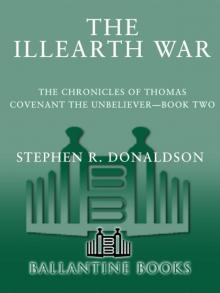 The Illearth War
The Illearth War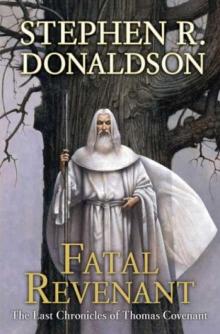 Last Chronicles of Thomas Covenant 02 - Fatal Revenant
Last Chronicles of Thomas Covenant 02 - Fatal Revenant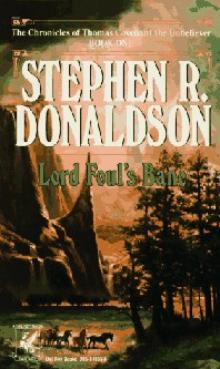 Lord Foul's Bane
Lord Foul's Bane The Gap Into Ruin: This Day All Gods Die
The Gap Into Ruin: This Day All Gods Die White Gold Wielder
White Gold Wielder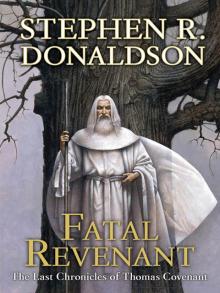 Fatal Revenant
Fatal Revenant The Mirror of Her Dreams
The Mirror of Her Dreams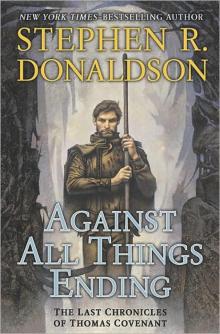 Against All Things Ending
Against All Things Ending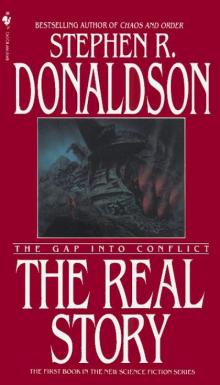 The Real Story: The Gap Into Conflict
The Real Story: The Gap Into Conflict The Power That Preserves
The Power That Preserves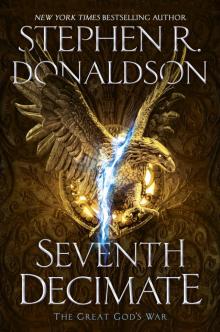 Seventh Decimate
Seventh Decimate The Gap Into Power: A Dark and Hungry God Arises
The Gap Into Power: A Dark and Hungry God Arises A Man Rides Through
A Man Rides Through The Gap Into Vision: Forbidden Knowledge
The Gap Into Vision: Forbidden Knowledge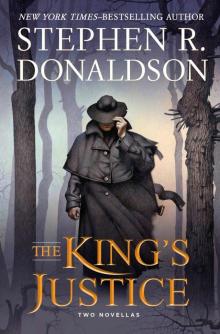 The King's Justice: Two Novellas
The King's Justice: Two Novellas The Wounded Land
The Wounded Land The Runes of the Earth
The Runes of the Earth Mordant's Need
Mordant's Need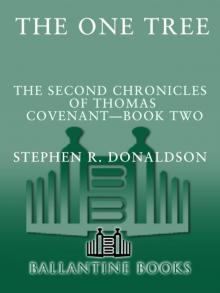 The One Tree
The One Tree Gilden-Fire
Gilden-Fire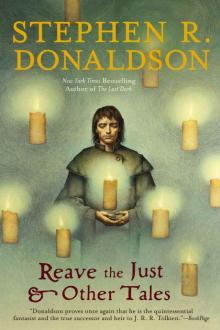 Reave the Just and Other Tales
Reave the Just and Other Tales The Man Who Fought Alone
The Man Who Fought Alone The Last Dark
The Last Dark The Man Who Tried to Get Away
The Man Who Tried to Get Away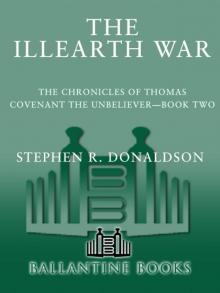 Thomas Covenant 02: The Illearth War
Thomas Covenant 02: The Illearth War A Dark and Hungry God Arises
A Dark and Hungry God Arises The One Tree t2cotc-2
The One Tree t2cotc-2 Lord Foul's Bane cotc-1
Lord Foul's Bane cotc-1 The Illearth War t1cotc-2
The Illearth War t1cotc-2 The Runes of the Earth: The Last Chronicles of Thomas Covenant - Book One
The Runes of the Earth: The Last Chronicles of Thomas Covenant - Book One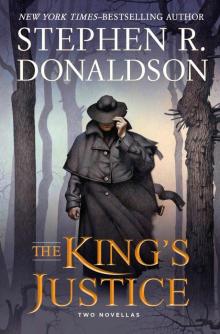 The King's Justice
The King's Justice White Gold Wielder t2cotc-3
White Gold Wielder t2cotc-3 The Power That Preserves t1cotc-3
The Power That Preserves t1cotc-3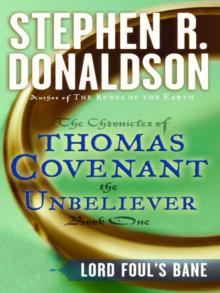 Thomas Covenant 01: Lord Foul's Bane
Thomas Covenant 01: Lord Foul's Bane Chaos and Order: The Gap Into Madness
Chaos and Order: The Gap Into Madness Daughter of Regals
Daughter of Regals Forbidden Knowledge: The Gap Into Vision
Forbidden Knowledge: The Gap Into Vision Fatal Revenant t3cotc-2
Fatal Revenant t3cotc-2 The Runes of the Earth t3cotc-1
The Runes of the Earth t3cotc-1 Thomas Covenant 03: Power That Preserves
Thomas Covenant 03: Power That Preserves This Day all Gods Die: The Gap into Ruin
This Day all Gods Die: The Gap into Ruin The Wounded Land t2cotc-1
The Wounded Land t2cotc-1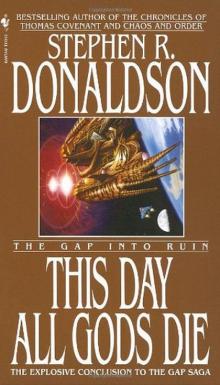 This Day All Gods Die
This Day All Gods Die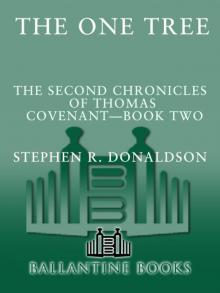 One Tree
One Tree